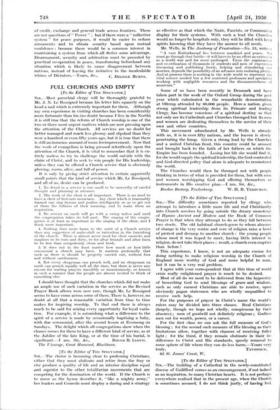Sin,—The difficulty sometimes reported by clergy who [To the Editor
of THE SPECTATOR.] attempt to introduce a little more life and real Christianity into Church services by going outside the dreary monotony of Hymns Ancient and Modern and the Book of Common Prayer is that when they attempt to do so they fall between two stools. The old habitual church-goers to whom absence of change is the very centre and core of religion raise a howl of protest and decamp to another church : the young people whose need it was hoped to meet, having little interest in religion, do not take their places : result, a church even emptier than before !
This experience, I know, is not an adequate excuse for doing nothing to make religious worship in the Church of England more worthy of God and more helpful to man, but it can be a very real problem.
I agree with your correspondent that at this time of world crisis really enlightened prayer is much to be desired.
Most of all do we need to be delivered from the hypocrisy of beseeching God to send blessings of grace and wisdom, such as only earnest Christians are able to receive, upon obviously pagan statesmen who are wholly unqualified to receive such help.
For the purposes of prayer in Christ's name the world's rulers may be divided into three classes. Real Christians (largely, though we hope not wholly, conspicuous by their absence) ; men of goodwill not definitely religious ; Godless men out for wealth, power, or a career.
For the first class we can ask the full measure of God's blessing ; for the second such measure of His blessing as their limitations allow, together with chances of receiving fuller light ; for the third, if they remain obstinate in their in- difference to Christ and His standards, speedy removal to some sphere of life where they can do less harm.—Yours very


















































 Previous page
Previous page